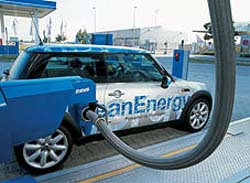
After several rounds of scrutiny by experts in more than one year, the research proposal by an international team on hydrogen research, dubbed HyApproval, has won the support of the Sixth European Commission Framework Program for Research and Technological Development (FP6). A research group led by Prof. LI Qing from the CAS Institute of Technical Institute of Physics and Chemistry is a partner of the research consortium.
The aim of the nearly four-million-euro project is to make a "handbook for approval of hydrogen refuelling stations" to be used to certify public hydrogen filling stations in Europe. The research will be conducted on the basis of a number of hydrogen projects in EU, US and Japan, including HySafe (Safety of Hydrogen as an Energy Carrier), StorHy (Hydrogen Storage Systems for Automotive Application), ECTOS (Ecological City Transport System), CUTE (Clean Urban Transport for Europe), ZERO REGIO (Lombardia and Rhein-Main towards Zero Emission) and CEP (Clean Energy Partnership Berlin).
The consortium has 25 partners, including many world-renowned research labs and enterprises in the field, such as National Renewable Energy Laboratory in US, Organisation for Applied Scientific Research in Netherlands, Commissariat a l'Energie Atomique in France, Shell Hydrogen, Total France, Air Liquide, BP Gas Marketing in UK, Air Liquide in France.
The so-called "hydrogen economy" will never exist if the public does not accept the product researchers have developed, according to scientists. Therefore, this project is to develop a public acceptance tool, using the tools and results of the HYFLEET, CUTE, ECTOS, ZERO REGIO, CEP projects. The results of this study will be annexed to the handbook.
The CAS Institute of Technical Institute of Physics and Chemistry has carried out studies and achieved encouraging progress in large-scale hydrogen separation, storage, transportation and applied system of hydrogen energy. Its research has also won support from the National high-tech Development Program (the 863 Program). Its involvement in the international research consortium proves its research capacity in the field and will lay a solid foundation for a leapfrog development of hydrogen studies in China.





